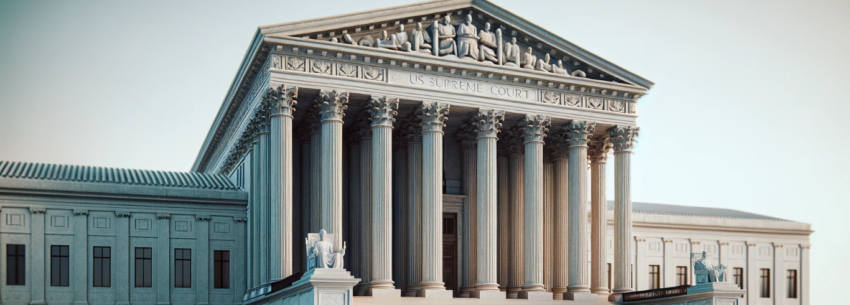| Listen to our audio presentation: Understanding the European Union |
The U.S Supreme Court is poised to decide a significant case that could reshape the future landscape of presidential accountability. Former President Donald Trump’s legal team is arguing that ex-presidents possess “absolute immunity from criminal prosecution for their official acts.” This argument forms the backbone of the impending Supreme Court ruling. The results could have profound implications, setting a precedent that allows former presidents to evade criminal prosecution, even for serious abuses of power, provided they avoid conviction in the Senate.
As it stands, the Constitution declares that, despite impeachment and removal, federal officials remain “liable and subject to indictment, trial, judgment and punishment, according to law.” Yet, Trump’s lawyers maintain this implies a former president can only face prosecution for power abuses once they have been impeached and removed—a scenario Trump avoided by completing his term before impeachment proceedings concluded.
This legal limbo has sparked anxiety across the spectrum. It proposes a potential loophole allowing presidents nearing their term’s end to commit infractions, banking on subsequently escaping impeachment. This was the case when Trump was impeached for inciting the 2021 Capitol riot but had already left office before the Senate could weigh his case.
Officials across the party lines, like Republican Majority Leader Mitch McConnell, have stressed that “former presidents are not immune from being held accountable,” knowing that criminal and civil judiciary systems exist even for past presidents. However, Trump’s legal team now challenges this age-old belief and maintains that even President Nixon was wrongfully worried about facing prosecution after his resignation during the Watergate scandal.
Trump’s dramatic defense hinges on the protection of executive power requiring unique leniency for former presidents. It warns of a paralyzing wave of frivolous or politically biased prosecutions against former presidents.
But the argument saw pushback in both a federal court and a unanimous appeals court panel, where Judge Florence Pan proposed a hypothetical situation of a president ordering an assassination but avoiding impeachment, voicing concern over the potential for complete lack of criminal liability in such severe cases.
The upcoming Supreme Court decision could notably influence the timing and outcome of Trump’s ongoing federal election trial. Trump faces four felony charges, all linked to his attempts to reverse his 2020 electoral defeat. Despite the serious allegations, Trump remains resolute, branding these charges as politically driven attempts to hamper his future political ambitions.
Yet, legal authorities and scholars alike question this “very robust” immunity claim. Justice Kagan underlined that presidents are not meant to be above the law, pointing to U.S history as a testament to this fact. Meanwhile, Justice Alito pondered whether prosecuting former presidents would affect the country’s democratic governance.
As the nation awaits the Super Court’s verdict, the ruling could define not only Trump’s legal future but also set a powerful precedent for presidential accountability.
Information Box:
– The U.S. Supreme Court case concerning former President Trump’s claim of immunity is currently underway.
– The claim insists on ‘absolute immunity’ for former presidents from criminal prosecution for their official acts.
– The interpretation of the Impeachment Judgment Clause of the Constitution is central to the case.
– The decision could significantly impact the commencement of Trump’s ongoing federal election trial.
– A range of sentiments are circulating, from fears of destabilizing the nation’s democratic operation to concerns about maintaining accountability.
Reference 1: Sullum, J. (2024, April 24). The Alarming Implications of Trump’s Immunity Claim. Reason.com
Reference 2: ILH Staff. (2024, April 25). Trump team gives Supreme Court shocking answer over presidents’ scope of immunity. Israelhayoom.com
Reference 3: Phillips, J. (2024, April 25). Justice Alito Questions whether Prosecuting Presidents would Undermine the Government. Epoch Times.

